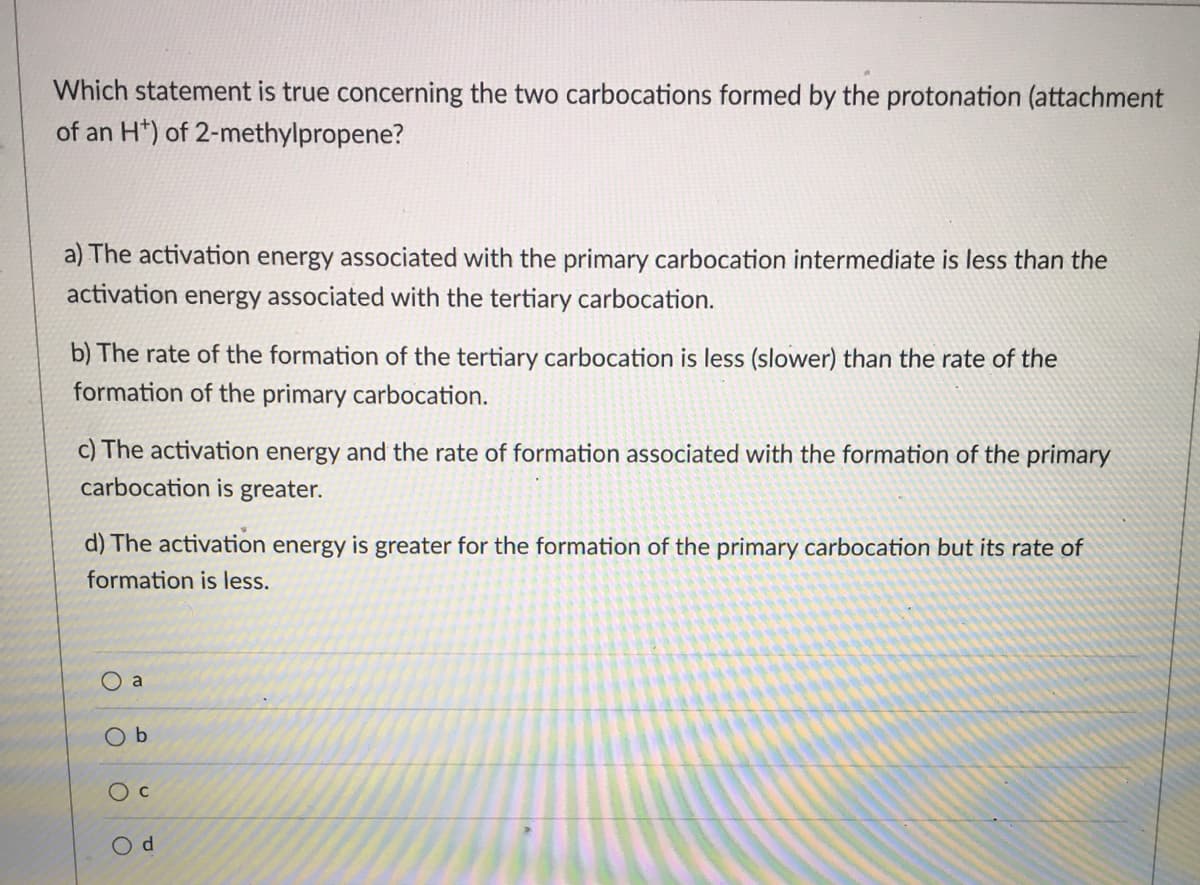Which statement is true concerning the two carbocations formed by the protonation (attachment of an H*) of 2-methylpropene? a) The activation energy associated with the primary carbocation intermediate is less than the activation energy associated with the tertiary carbocation. b) The rate of the formation of the tertiary carbocation is less (slower) than the rate of the formation of the primary carbocation. c) The activation energy and the rate of formation associated with the formation of the primary carbocation is greater. d) The activation energy is greater for the formation of the primary carbocation but its rate of formation is less. O a O b Od
Which statement is true concerning the two carbocations formed by the protonation (attachment of an H*) of 2-methylpropene? a) The activation energy associated with the primary carbocation intermediate is less than the activation energy associated with the tertiary carbocation. b) The rate of the formation of the tertiary carbocation is less (slower) than the rate of the formation of the primary carbocation. c) The activation energy and the rate of formation associated with the formation of the primary carbocation is greater. d) The activation energy is greater for the formation of the primary carbocation but its rate of formation is less. O a O b Od
Chapter1: Lewis Structures
Section: Chapter Questions
Problem 63EQ
Related questions
Question

Transcribed Image Text:Which statement is true concerning the two carbocations formed by the protonation (attachment
of an H*) of 2-methylpropene?
a) The activation energy associated with the primary carbocation intermediate is less than the
activation energy associated with the tertiary carbocation.
b) The rate of the formation of the tertiary carbocation is less (slower) than the rate of the
formation of the primary carbocation.
c) The activation energy and the rate of formation associated with the formation of the primary
carbocation is greater.
d) The activation energy is greater for the formation of the primary carbocation but its rate of
formation is less.
O a
O b
Expert Solution
This question has been solved!
Explore an expertly crafted, step-by-step solution for a thorough understanding of key concepts.
This is a popular solution!
Trending now
This is a popular solution!
Step by step
Solved in 2 steps

Knowledge Booster
Learn more about
Need a deep-dive on the concept behind this application? Look no further. Learn more about this topic, chemistry and related others by exploring similar questions and additional content below.Recommended textbooks for you


Organic Chemistry: A Guided Inquiry
Chemistry
ISBN:
9780618974122
Author:
Andrei Straumanis
Publisher:
Cengage Learning

EBK A SMALL SCALE APPROACH TO ORGANIC L
Chemistry
ISBN:
9781305446021
Author:
Lampman
Publisher:
CENGAGE LEARNING - CONSIGNMENT


Organic Chemistry: A Guided Inquiry
Chemistry
ISBN:
9780618974122
Author:
Andrei Straumanis
Publisher:
Cengage Learning

EBK A SMALL SCALE APPROACH TO ORGANIC L
Chemistry
ISBN:
9781305446021
Author:
Lampman
Publisher:
CENGAGE LEARNING - CONSIGNMENT